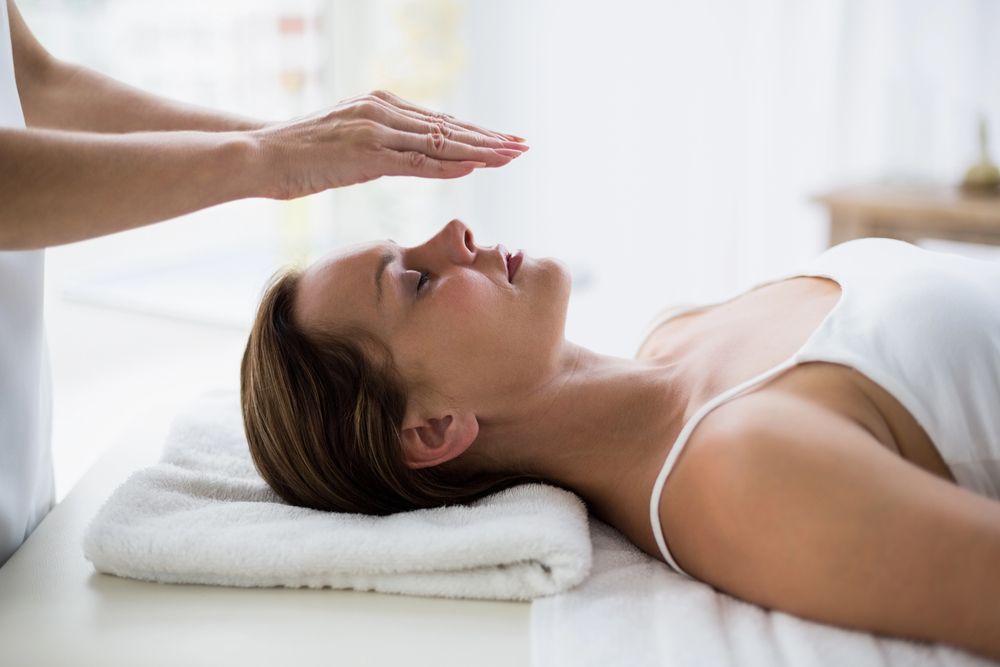What is Reiki? Many people have heard of Reiki, the Japanese technique for stress reduction and relaxation that also promotes healing, but few understand how it works or why it’s so effective.
Reiki healing is based on the concept that energy flows through us, and imbalances in this energy can cause physical or emotional stress. Using the hands to channel healing energy, Reiki practitioners aim to restore the natural flow of energy in the body and facilitate healing on many levels.
In this article, we will explore the science behind Reiki, how it works, and why it has become a popular complementary therapy for individuals seeking balance and healing. Through understanding the energetic principles at play, we’ll uncover how Reiki works from both a metaphysical and scientific perspective, as well as how this ancient technique can support modern health practices.
What Is Reiki?
Reiki is an energy healing technique developed in Japan by Mikao Usui in the early 20th century. The word “Reiki” itself comes from two Japanese words: “Rei” meaning universal or spiritual, and “Ki” meaning life force energy. Reiki, therefore, translates to “universal life force energy,” the energy that flows through all living beings and is essential to life itself.
Reiki practitioners believe that this life force energy flows through the body along pathways called meridians, which can become blocked or unbalanced due to stress, injury, or illness. The flow of this energy is thought to be closely connected to our physical and emotional well-being.
By channeling energy through their hands, Reiki practitioners aim to clear blockages and restore the proper flow of energy in the body, promoting healing on both physical and emotional levels.
One of the key elements of Reiki is its ability to encourage the recipient’s body to heal itself. Unlike some other forms of healing, Reiki doesn’t involve manipulation or intervention in the body’s systems. Instead, it is based on the principle that the body has an inherent ability to heal, and Reiki helps facilitate that process by restoring balance to the energy systems.
How Does Reiki Work?
The central question for many people is, how does Reiki work? While Reiki is often considered an alternative or complementary therapy, its methods are grounded in principles that may sound unusual to those unfamiliar with energy healing.
The Concept of Life Force Energy
At the core of Reiki healing is the concept of Ki, the vital life force energy that is believed to animate all living things. This concept is not new; it’s similar to ideas found in other cultures, such as Chi in Chinese medicine or Prana in Ayurveda. These life forces are thought to flow through the body and can become blocked, imbalanced, or stagnant due to physical injury, emotional trauma, or stress.
Reiki practitioners believe that when the energy flow is interrupted or disrupted, it can manifest as physical illness, emotional distress, or mental health issues.
Reiki works by facilitating the free flow of this energy through the body, thereby promoting healing and balance. The practitioner uses their hands to channel the healing energy to specific areas of the body, helping to clear any blockages and restore harmony.
While Reiki doesn’t physically manipulate the body, the energy that is directed through the hands during a session is said to encourage the recipient’s body to heal itself, resulting in reduced stress, pain relief, and emotional healing.
Energy Transfer Between Practitioner and Recipient
In a typical Reiki session, the recipient lies fully clothed on a massage table while the practitioner lightly places their hands on or near the body. The Reiki practitioner channels the universal life force energy into the recipient by holding their hands over specific areas of the body.
It’s believed that this energy flows through the practitioner’s hands into the recipient, helping to clear blockages, restore balance, and promote overall healing.
Although Reiki energy is not something that can be seen or touched in a traditional sense, many people report feeling sensations during a session, such as warmth, tingling, or a gentle pulsing sensation. These sensations are often interpreted as signs that the energy is flowing and working to clear blockages.
One important aspect of Reiki is that the energy does not come from the practitioner but from the universal life force. The practitioner acts as a conduit or channel, facilitating the flow of energy to where it’s needed most.
This means that Reiki can be done without the practitioner feeling drained or depleted of their own energy, as the energy is not coming from them but from an external, universal source.
The Role of the Mind-Body Connection
Another key aspect of how Reiki healing works is its impact on the mind-body connection. Reiki is often used to address both physical and emotional concerns, which are often interlinked. For instance, physical pain can stem from emotional stress or unresolved trauma, and Reiki helps by clearing both physical and emotional blockages.
During a Reiki session, the body enters a deeply relaxed state, which triggers the parasympathetic nervous system (also known as the “rest and digest” system). This state of deep relaxation can help reduce stress hormones like cortisol, lower blood pressure, and boost the body’s natural healing processes.
Stress and anxiety can cause a wide range of physical symptoms, including headaches, muscle tension, digestive issues, and even chronic conditions like heart disease. By helping the body enter a relaxed state, Reiki can be a powerful tool for managing stress and improving mental health. When the energy flow is balanced, it can encourage the body to release toxins and support its natural repair processes.
Reiki for Stress Relief and Emotional Healing
One of the most well-known uses of Reiki is for stress relief and emotional healing. In today’s fast-paced world, stress has become a constant companion for many, leading to both mental and physical health issues. Reiki helps combat stress by encouraging relaxation, which, in turn, reduces anxiety and emotional strain.
Reiki’s calming effect on the nervous system is particularly beneficial for people dealing with emotional challenges such as grief, trauma, or depression. By promoting a deep state of relaxation, Reiki helps release emotional tension and supports emotional balance. Many individuals report feeling lighter, more peaceful, and emotionally grounded after a Reiki session.
Reiki can also aid in reducing the physical manifestations of stress, such as muscle tension, headaches, and insomnia. The combination of emotional and physical benefits makes Reiki a powerful tool for overall wellness.
Reiki in Complementary and Integrative Medicine
Reiki is increasingly being integrated into hospitals, wellness centers, and clinics as a complementary therapy alongside conventional medical treatments. It is often used in conjunction with other therapies, such as massage, acupuncture, or psychotherapy, to support the healing process.
By focusing on the energetic and emotional aspects of health, Reiki enhances the body’s natural healing abilities and works in harmony with other treatment modalities. Many individuals use Reiki to manage symptoms related to chronic illness, cancer recovery, and mental health disorders, including depression and anxiety.
The Benefits of Reiki Healing
Reiki has gained popularity worldwide due to its wide range of benefits for both physical and emotional well-being. The practice is gentle and non-invasive, making it accessible to people of all ages and health conditions. Below are some of the key benefits that Reiki healing can provide.
Pain Management
One of the most common reasons people seek Reiki therapy is for pain relief. Reiki can help alleviate both acute and chronic pain by promoting relaxation, reducing muscle tension, and encouraging the body’s natural healing processes. Many individuals report a significant reduction in pain after just a few sessions.
Reiki can be used to help manage conditions such as migraines, arthritis, fibromyalgia, back pain, and other chronic pain disorders. By restoring balance to the body’s energy field, Reiki can help reduce the intensity of pain, allowing for greater comfort and improved quality of life.
Improved Sleep
Stress and anxiety are often the root causes of sleep disturbances. Since Reiki promotes relaxation and helps to reduce anxiety, it can be a helpful tool for individuals struggling with insomnia or other sleep-related issues. The calming effect of Reiki can help the body and mind transition into a more restful state, making it easier to fall asleep and stay asleep throughout the night.
Many people who undergo Reiki report feeling more relaxed and rested, even after just one session. By calming the nervous system and restoring energy balance, Reiki allows for more restorative sleep, which is essential for overall health and well-being.
Reduced Anxiety and Stress
In a world that’s constantly moving at a fast pace, stress has become a common challenge for many. Chronic stress can have a significant impact on both physical and mental health, contributing to conditions such as hypertension, digestive issues, depression, and anxiety.
Reiki helps by addressing the underlying causes of stress and encouraging relaxation. By balancing the energy system and calming the mind, Reiki can reduce anxiety, promote emotional stability, and provide a sense of inner peace. Regular Reiki sessions can also improve resilience to stress, making it easier to cope with difficult situations.
Enhanced Emotional Healing
Reiki healing isn’t just about physical wellness, it can also be deeply transformative for emotional health. Many individuals seek Reiki to help with emotional challenges such as grief, trauma, depression, or anxiety. Reiki helps release emotional blockages and restore harmony within the body’s energy field.
During a Reiki session, the practitioner channels healing energy that encourages the body to release pent-up emotions and unresolved feelings. This can create a profound sense of emotional release and healing, allowing individuals to process their emotions more easily and move forward with greater emotional clarity.
Better Focus and Mental Clarity
Reiki can also improve mental clarity, concentration, and focus. By reducing stress and promoting relaxation, Reiki helps clear mental fog, allowing individuals to think more clearly and feel more present. This enhanced mental clarity is particularly useful for those who feel overwhelmed by daily responsibilities or who are struggling with anxiety or confusion.
For individuals seeking to improve cognitive performance or boost creativity, Reiki offers a gentle and natural way to reset the mind and restore focus.
Support During Physical Healing
Reiki is also commonly used to support physical healing, especially during recovery from surgery, illness, or injury. While Reiki is not a substitute for medical treatment, it can be an effective complement to traditional care. It helps accelerate the body’s natural healing process by promoting circulation, reducing inflammation, and encouraging the body’s energy systems to work in harmony.
Many individuals undergoing medical treatments, such as chemotherapy or surgery, turn to Reiki to help alleviate side effects, reduce pain, and improve their overall sense of well-being. Reiki’s holistic approach helps restore balance and can enhance the body’s ability to heal itself, providing additional support during the recovery process.
Integrating Reiki Into Your Wellness Routine
Reiki is a versatile therapy that can be easily integrated into any wellness routine. Here are a few tips on how to make Reiki a regular part of your life.
Book Regular Reiki Sessions
The best way to experience the benefits of Reiki is by incorporating it into your routine. Many Reiki practitioners offer packages or regular sessions to help maintain the flow of energy in your body and prevent blockages from building up. Whether it’s once a week, once a month, or as needed, regular Reiki sessions can help you stay balanced and aligned.
Combine Reiki with Other Wellness Practices
Reiki can be combined with other wellness practices, such as meditation, yoga, or acupuncture, for a holistic approach to health. The calming effects of Reiki can enhance the benefits of other therapies, allowing you to experience deeper relaxation and emotional healing.
Practice Self-Reiki
In addition to receiving Reiki from a practitioner, many people learn how to practice Reiki on themselves. After receiving Reiki training, individuals can perform self-healing by placing their hands on their body in specific positions to channel healing energy. This can be especially beneficial for managing stress, relieving tension, or addressing minor ailments on your own.
Use Reiki to Boost Emotional and Spiritual Growth
Reiki can enhance personal growth, spiritual development, and emotional healing. Many individuals use Reiki to clear emotional blockages, release old patterns, and deepen their connection to their inner selves. By engaging in Reiki regularly, you can facilitate emotional healing, gain clarity, and develop a stronger sense of self-awareness.
Reiki and Its Role at OASIS Mind & Body
At OASIS Mind & Body, we uphold the importance of balancing both the mind and body when it comes to health and wellness. We provide Reiki healing as part of our holistic approach to mental and physical well-being. We integrate Reiki into our comprehensive care plans, alongside our psychiatric and therapeutic services, to support emotional and physical healing.
Our skilled Reiki practitioners are trained to help you address both physical and emotional issues, including stress, anxiety, chronic pain, or emotional blockages. Through personalized Reiki sessions, we aim to help you restore balance and healing, empowering you to live a more peaceful and centered life.
In addition to Reiki, our holistic services include sound healing, meditation, breathwork, and other therapies designed to promote overall well-being. We believe that every person is unique, and our goal is to help you achieve optimal health by addressing your specific needs through a combination of healing modalities. Contact us today to schedule an appointment.







